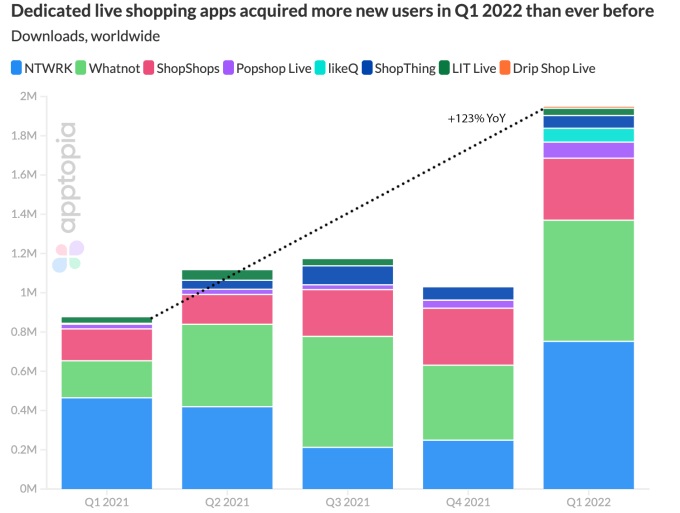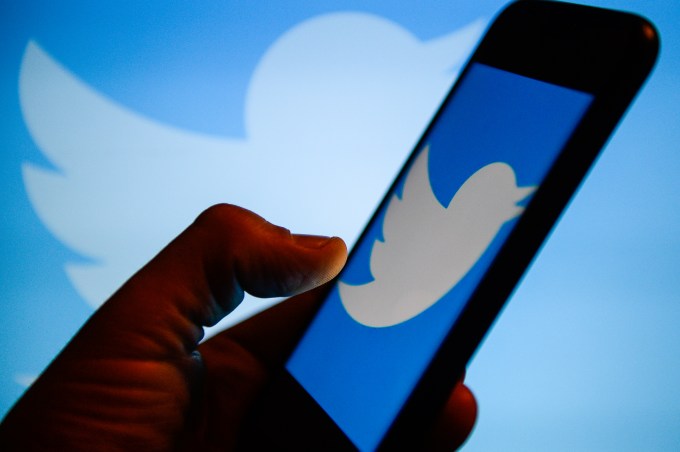Welcome back to This Week in Apps, the weekly TechCrunch series that recaps the latest in mobile OS news, mobile applications and the overall app economy.
The app industry continues to grow, with a record number of downloads and consumer spending across both the iOS and Google Play stores combined in 2021, according to the latest year-end reports. Global spending across iOS, Google Play and third-party Android app stores in China grew 19% in 2021 to reach $170 billion. Downloads of apps also grew by 5%, reaching 230 billion in 2021, and mobile ad spend grew 23% year over year to reach $295 billion.
Today’s consumers now spend more time in apps than ever before — even topping the time they spend watching TV, in some cases. The average American watches 3.1 hours of TV per day, for example, but in 2021, they spent 4.1 hours on their mobile device. And they’re not even the world’s heaviest mobile users. In markets like Brazil, Indonesia and South Korea, users surpassed five hours per day in mobile apps in 2021.
Apps aren’t just a way to pass idle hours, either. They can grow to become huge businesses. In 2021, 233 apps and games generated over $100 million in consumer spend, and 13 topped $1 billion in revenue. This was up 20% from 2020, when 193 apps and games topped $100 million in annual consumer spend, and just eight apps topped $1 billion.
This Week in Apps offers a way to keep up with this fast-moving industry in one place, with the latest from the world of apps, including news, updates, startup fundings, mergers and acquisitions, and suggestions about new apps to try, too.
Do you want This Week in Apps in your inbox every Saturday? Sign up here: techcrunch.com/newsletters
Top Stories
Google bans call-recording apps
Google updated its Play Store policies to ban third-party call-recording apps from the Play Store, effective as of May 11. Developers had been using the Accessibility API to enable remote call audio recording as a workaround to make these apps work after Google blocked call recording on Android 6 and via the microphone on Android 10. The change was announced alongside other updates on April 6, but a Reddit post drove new awareness of the crackdown. Google also livestreamed a policy update this week where it explained this was not actually a “new” policy, necessarily, but rather a clarification to an existing one. (The video is labeled April 2020 but this appears to be a mislabel, because YouTube shows it was streamed April 2022 — and commenters are also noting the typo.) While that may be true, the company had not taken action on apps using the Accessibility API in this way.
In the webinar, Moun Choi, who works on the Trust & Safety Play Regional Ops team for Google Play, explained the focus of the policy was directed toward third-party apps where the call recording was taking place without the other user’s awareness. The default dialer on the phone would not be impacted by this, as it doesn’t need the accessible capability to get access to the incoming audio stream, he said. The company didn’t clarify if existing apps would be removed from the Play Store when the policy goes into effect, however.
BeReal: Hype or hit?
An app called BeReal, founded by former GoPro employee Alexis Barreyat along with Kévin Perreau, launched in December 2019 with the idea to ask users to post an unedited photo once per day after receiving a notification. The user then has up to 2 minutes to share what they’re up to and see the photos their friends also posted. The app has recently gained a lot of attention amid rapid growth and a daily active user base that’s now reached nearly 3 million, according to data from Apptopia. But when an app grows this quickly, there are usually some paid user acquisition efforts involved. This week, we took a look into how BeReal may be capitalizing on its newer features and college ambassador program to drive installs and its five-star reviews. The verdict: It’s too soon to know if BeReal can self-sustain when the funds run out.
Musk secures his Twitter bid
Elon Musk this week secured $46.5 billion to acquire Twitter, per an SEC filing. The Telsa and SpaceX chief’s offer for the social network includes $25.5 billion in debt financing from Morgan Stanley and other firms, including Bank of America, Barclays, MUFG, Societe Generale, Mizuho Bank and BNP Paribas. Musk said he’s committed to about $21 billion in equity financing. Previously, Musk hadn’t been specific about how he would pay for the investment, so these financial commitments make the deal more serious. The tech CEO hasn’t yet said if he will make a tender offer, however. Twitter had already adopted a poison-pill defense of its equity as a result of Musk’s unsolicited bid.
Weekly News
Platforms: Apple
- Apple is discontinuing its Fleetsmith device management service, acquired in 2020, after rolling out its new Apple Business Essentials service that effectively replaces it with expanded capabilities. The Jamf competitor had already lost support for distributing third-party apps following its acquisition. Apple said the service will be closed on April 21, 2022, at which point no news users can be added. It will fully shut down on October 21, 2022.
- Apple is rolling out its “communication safety in Messages” child safety feature to users in the U.K., Canada, New Zealand and Australia. This is the newly announced feature that allows parents to turn on warnings for their kids’ iPhones and scans incoming and outgoing photos for nudity. If nudity is found in an incoming, the photo is blurred and the child is warned it contains sensitive content. When outgoing, the child is encouraged not to send the photo and to instead message a grown-up. The feature is designed to help protect children from predators and exploitation, Apple says.
- Apple rolled out the second betas for iOS 15.5, iPadOS 15.5, tvOS 15.5 and watchOS 8.6. Developers discovered hints in the new release that Apple may rebrand the iTunes Pass card in favor of the “Apple Account Card” — another attempt to move further away from the iTunes branding.
Platforms: Google
- Google changed how new emojis will roll out to Android. Starting with Android 12, emoji are being decoupled from OS updates so they can arrive on the device at any time there’s a new release.
- Google’s AirDrop competitor Nearby Share will be getting a new “self-share” mode that lets you send files between your own devices, users spotted.
- A review of the Amazon Appstore on Windows 11 found many of Android’s most popular apps were missing, along with other compatibility issues making for an overall poor experience.
- Google’s Switch to Android app officially began to roll out to iOS users. The company said it expects this process to reach 10% of users by the end of the day on Tuesday, April 19, and 100% of users over the next couple of weeks.
E-commerce

Image Credits: Apptopia
- Live shopping apps just had their best quarter, says Apptopia, in terms of new user acquisition. The top eight live shopping apps grew their installs 123% year-over-year in the first quarter, but their collective user base is still small considering the amount of VC investment they’ve seen. Combined, the apps have less than two million monthly active app users. The firm looked at apps like Whatnot, NTWRK, Popshop Live, ShopShops, likeQ, ShopThing, LIT Live and Drip Shop Live in its analysis.
- Chinese social e-commerce app Xiaohongshu laid off 9% of staff amid China’s regulatory crackdowns. The app had previously raised $500 million in November, valuing the business at $20 billion.
Augmented Reality

Image Credits: Disney
- Snap and Disney teamed up to create an AR Cinderella Castle mural at Disney World’s Magic Kingdom Park. Visitors can add to the mural using the My Disney Experience mobile app when they’re at the park by selecting “Mural of Memories” from the home screen then holding their phone up to Cinderella Castle. Through the app, you can see the available sections of the castle and choose where to pin your photo. The feature leverages Snap’s CameraKit, which allows users to see everyone’s pinned photos in an AR view.
Fintech
- Plaid co-founder William Hockey launched his next project: a nationally chartered bank, Column, designed to power fintech apps. The bank is actually a rebranded community bank — Northern California National Bank, or NorCal — that the company purchased for $50 million last year.
- PayPal and Venmo announced an increase in their instant transfer fees for both consumers and merchants in the United States. Personal accounts on PayPal and consumer and business profiles on Venmo will pay 1.75% of the transfer amount, with a minimum fee of $0.25 and a maximum fee of $25.
- Robinhood is fighting for market share in Europe, The Information reports, suggesting the app may be too late to fend off the fierce competition.
- WhatsApp is reportedly struggling to sign up local partners in Brazil for its business payments service as it waits for central bank approval.
Social

Omar Marques/SOPA Images/LightRocket via Getty Images
- Twitter woos developers back with an app platform. The company began testing a new experience that will showcase third-party apps and services directly on Twitter’s platform. Initially, it’s pointing to various safety tools, like Block Party, but envisions a future where developers’ apps are discovered throughout the experience, or possibly even in a marketplace setting.
- TikTok announced the global launch of “Interactive Add-Ons,” a new feature that allows brands to enhance their In-Feed Ads with popups, stickers and other visual elements. Brands can choose either Standard or Premium add-ons. The former focuses on driving clicks and conversions, while the latter is focused on upper-level goals, like brand awareness and community building.
- Snap said it has begun testing mid-roll ads in Spotlight, the social app’s TikTok-like short video feature. The test is still limited but is designed as another way for both Snap and creators to make money through the content, via a rev share. The company had already rolled out mid-roll ads inside Stories and noted those ads can be seamlessly transferred to Spotlight.
- Snap-owned Zenly, a social maps app with now 35 million MAUs, rolled out its biggest redesign to date. The app’s color scheme now features a black background, thinner fonts and yellow and orange tints. The update also introduces a new map; new search tools for finding friends, places and addresses; more automated check-ins; a new profile section called My world for showing off your hangouts; and more.
- Instagram announced it would tweak its ranking system to highlight original content, as opposed to accounts that aggregate or repost from others, across both Reels and its Feed. It also added support for fundraisers in Reels.
- Snap’s Q1 2022 saw healthy user growth amid an earnings miss. Snap missed Wall Street expectations for profit and sales in the first quarter, pulling in a loss of 2 cents versus the expected 1 cent earnings, and revenue of $1.06 billion versus the $1.07 billion expected. But the app’s bright spot was user growth, 332 million DAUs (up 18% YoY) versus 330 million expected. This follows five previous quarters of user growth north of 20%. But Snap is still adapting to the fallout from Apple’s Privacy Changes. Though it’s implemented new measurement solutions that better respect user privacy, Snap told investors the changes take time. “They put a serious onus on advertisers to adapt and reset their advertising campaigns across not just Snap, but all platforms. We empathize with them,” says Snap Chief Business Officer Jeremi Gorman.
- Open source Twitter alternative Mastodon arrived on Android. While Twitter is aiming to decentralize, Mastodon already has. And it now has 4.4 million users worldwide, per its website.
- Instagram tricks users into clicking “Reels” by replacing the Recent tab on hashtag pages with a button for Reels in its latest test. That’s not fair!
- Instagram also launched product tagging to all U.S. users, as promised in March. The feature allows users to tags companies and brands in their posts, but not for monetization purposes.
- Meta’s NPE Team, its internal incubator, is hiring in Seoul, South Korea. The team will focus on developing technology specific to the needs of users in the country, which may include apps focused on jobs, gaming and other social needs.
- Reverse engineers took a look at what Twitter has built so far for its in-app Edit button. The current development hints the Edit button would not actually correct or change the text in the original tweet — it would create a new tweet with the updated content.
Dating
- Muslim dating app Muzmatch lost the right to use its brand name after a U.K. court ruled in favor of Match in a trademark dispute. Muzmatch said it would appeal the ruling.
Streaming & Entertainment
- Netflix lost 200,000 subscribers in the first quarter. The streaming app missed Wall Street estimates by a mile, as they were aiming for 2.5 million net new additions. It also brought in $7.8 billion in revenue versus $7.95 billion expected. Netflix said it will focus on quality, crack down on password sharing and try out an ad-supported model to regain growth.
- Spotify closed down its yet-to-launch Greenroom Creator Fund with its shift in live audio strategy. The company recently announced that it would transition live audio content from its “Greenroom” app to its flagship streaming app while rebranding Greenroom as Spotify Live.
- Apple Music launched DJ mixes in spatial audio with Dolby Atmos along with 15 “Boiler Room” mixes that were captured at nightclubs, festivals and raves and were newly mixed in spatial audio.
- European music streaming company Deezer announced plans to go public via a French SPAC. The deal values Deezer at a pre-money equity valuation of €1.05 billion and at €1.08 billion in enterprise value terms.
- CNN’s mobile app saw its U.S. usage decline 11% in the three weeks following CNN+’s launch compared to the three weeks prior, according to Sensor Tower data. Warner Bros. Discovery announced this week it would shut down the new streaming service only a month after launch, citing a different set of priorities.
- The AMC mobile app for its U.S. theaters now accepts Dogecoin, Shiba Inu and other cryptocurrencies to pay for movie tickets and snacks.
Gaming
- Epic Games settled a lawsuit revolving around in-game purchases made by minors using their parents’ credit cards. Epic will pay out $26.5 million to be shared among those who brought the suit, plus 1,000 “V bucks” for in-game purchases.
- Netflix said it will launch a new “Exploding Kittens” mobile game tied to an animated TV series. The game and show will be based on the popular Exploding Kittens card game. The mobile game will launch in May exclusively for Netflix members, along with two new cards for players. The TV series, which is produced by Greg Daniels and Mike Judge, will arrive in 2023.
Utilities
- Apple Maps app rolled out updated maps to Singapore and Germany, featuring faster and more accurate navigation; comprehensive views of roads, buildings, parks and shopping centers; and 3D landmarks of locations like Gardens by the Bay and Tiong Bahru Market. It also added cycling directions in Chicago, Detroit and Indianapolis.
- Brave’s browser is rolling out a “De-AMP” feature that will allow users to automatically bypass Google’s Accelerate Mobile Pages (AMP) to instead take users directly to original websites. The feature is available on the desktop and Android.
Funding and M&A
 a16z-backed Levels, a company whose glucose monitors work with a paired app, raised $38 million in Series A funding, valuing the business at $300 million. The company had previously offered services to 25,000 beta testers but plans to expand internationally this year.
a16z-backed Levels, a company whose glucose monitors work with a paired app, raised $38 million in Series A funding, valuing the business at $300 million. The company had previously offered services to 25,000 beta testers but plans to expand internationally this year.
 A startup enabling no-code mobile app building, Glide, raised $20 million in Series A funding led by Benchmark with participation from YC Continuity, First Round, SV Angel and others. The company says 500,000 users have built 1 million apps with its platform.
A startup enabling no-code mobile app building, Glide, raised $20 million in Series A funding led by Benchmark with participation from YC Continuity, First Round, SV Angel and others. The company says 500,000 users have built 1 million apps with its platform.
 Robinhood acquired crypto app Ziglu, a London-based app for trading bitcoin and other cryptocurrencies. The deal could help Robinhood gain growth in the competitive European market.
Robinhood acquired crypto app Ziglu, a London-based app for trading bitcoin and other cryptocurrencies. The deal could help Robinhood gain growth in the competitive European market.
 Indian crypto exchange and mobile app CoinDCX raised $135 million in new funding, topping a $2.1 billion valuation. Steadview and existing backer Pantera co-led CoinDCX’s Series D financing.
Indian crypto exchange and mobile app CoinDCX raised $135 million in new funding, topping a $2.1 billion valuation. Steadview and existing backer Pantera co-led CoinDCX’s Series D financing.
 Clipboard Health, an app-based marketplace that matches nurses with nearby open shifts, raised $50 million Series B and a $30 million Series C at a $1.3 billion valuation.
Clipboard Health, an app-based marketplace that matches nurses with nearby open shifts, raised $50 million Series B and a $30 million Series C at a $1.3 billion valuation.
from TechCrunch
via Click me for Details

No comments:
Post a Comment